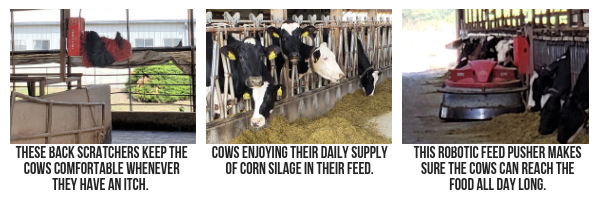From the Farm:
BLOG: Happy Cows Come From…Kansas!
By Deb Ohlde, Central Kansas Corn Crew Rep
Amanda (Mandy) Welch grew up on Meier Dairy near Palmer in Washington County, but she didn’t have any intention of coming back to the farm. After high school she got a degree in graphic design and started a career away from the family farm. Then several years ago, their family-owned operation decided to take a big step and implement robotics. And Mandy made the big step to move back home.
Generally, the cows are milked by the robotic milkers without human intervention, but some cows need encouragement to get started. Sensors provide feedback if the milker isn’t attached and/or if the milking fails. Mandy makes sure they get a good milking and if there is a specific reason the milking fails, such as mastitis, she can then treat the cow.
Cow comfort is of utmost importance on Meier Dairy. If cows are stressed or hungry, they won’t produce to their full potential. That means fans are on when it is warm, sprinklers run in the summer, and doors are closed when it is cold. A robotic feed pusher also keeps feed pushed up in the bunk for easy cow access.

“You really do get to know the cows and their individual needs,” Mandy says. “We have one cow that is 12-years-old. I give her a little pep talk each morning to get her going. When I’m cleaning stalls and pens, it is all about making them comfortable.”
Mandy and her siblings are fourth generation dairy farmers, and they were the first dairy in Kansas to use this robotic milking system. The switch to robotics was a milestone for their dairy, but it took many years of evolving and trying new things to get to where they are today. At present they are milking 650 cows, multiple times per day and that is probably where they will stay.
Robotics have allowed Meier Dairy to reap the benefits of knowledge as more information is collected on each cow every time they are milked. The human touch is still important, but the data gathered by the robotic system helps identify when a cow is not eating enough, when a milking is incomplete or when a cow is ready to have another calf. While doing that, it also makes it possible for the Meier family to stop and take a breath more often than before.
“It helps our family have more time to invest in other aspects of the dairy,” Mandy says, “to have more uninterrupted family time, and the cows are really content when they can do their own thing on their schedule.”
Corn plays a vital role on Kansas’ dairies, and September was silage chopping season at Meier Dairy. As long as it’s feasible, they grow their own corn so they have knowledge of how that feed was grown and what practices were used to raise it. Silage is not easy to transport long distances, so if they can’t raise all their own feed they are able to work with other farmers in the area to purchase feed locally.
“Corn is the most important ingredient in our feed and feed is a topic we discuss every day,” Mandy says. “We have weekly meetings to discuss the operation and corn always comes up. We talk about what we can do to get the best crop for our cows. It makes such a huge difference. Quality of feed helps them consume more and that leads directly to production. Everyone on our team from the feeder to the herdsman, to the person who plants and chops the feed, understands the value of our corn crop.”
She also noted, “we are pretty excited about our crop this year, we are going to have something delicious and yummy for our girls to munch on.”
Corn is also an ingredient in the pellets automatically dispensed while the cows are milking, but Mandy says corn silage in the bunk is still the biggest use of corn at their dairy.
Meier Dairy works with Kansas State University and crop consultants from their local elevator to monitor their corn crop and give them direction on when to chop. Their nutritionist from K-State visits at least once per month. They have also participated in on-farm research with K-State because they know first-hand how valuable the information is to their operation.
“We also network with other producers all the time from as far away as Canada and Europe,” Mandy says. “We all learn from each other.”
That connection to other producers is key when implementing new ideas. In the future, Meier Dairy foresees adding even more technology, possibly focused on cow hoof health. Foot issues are the number one reason a cow is culled and there are options for incorporating a foot bath into the milking station that show promise for dealing with foot care on a daily basis.
Mandy is happy to tell the story of their farm and loves to have visitors. She believes strongly in making a connection to consumers and showing off all the high-tech ways they put cows first.
“We have to humanize what we do for people,” she says, “so they hear our story from us and not from someone who has never even been here.”


